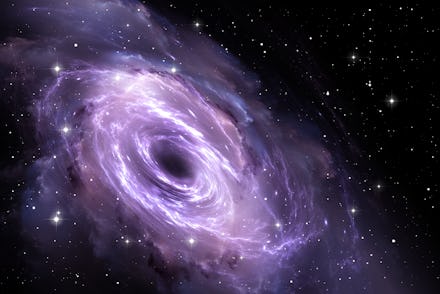New black hole discoveries could force scientists to rethink the laws of physics

Black holes continue to be some of the most mysterious objects in space. But when it comes to one of the enigmas they've presented to the scientific community, findings from a recent study may have offered a few answers. It all lies within the strange "echoes" in spacetime black holes reportedly give off, which could end up spiraling off into an entirely new branch of physics, if scientists can ever research said echoes properly.
The new study, published in the Journal of Cosmology and Astroparticle Physics, posits that these echoes in spacetime, if they are indeed real, would be the result of interactions between matter and black holes. They could help scientists determine whether the matter that ends up "sucked into" black holes is actually gone forever, or if it's simply coming out somewhere else.
"This is a very exciting area of research," astrophysicist and study co-author Niayesh Afshordi from the University of Waterloo explained. "It touches on cornerstones of physics and science as we know it."
Black holes are known as intense objects in space with a gravitational pull so massive that not even light can escape their borders, also known as their "event horizon."
"Event horizons are found at places that you cannot test or experimentally verify, because nothing inside the event horizon can get out, according to the theory of relativity," said Afshordi. “Exactly what happens at that boundary is really anyone’s guess.”
If scientists are able to detect these echoes, it would give scientists their "smoking gun" sign of new physics that would need to be studied, according to physicist Vitor Cardoso from the Instituto Superior Técnico in Portugal.
"The presence of echoes would certainly be a strong indication that black holes are not the classical perfect-absorber we think they are," Cardoso told Vice via email. "If observed, they would change completely our understanding of quantum gravity, and would finally give us clues to when quantum effects become important in gravitational physics."
Scientists have been studying quantum mechanics more intensely in recent years due to newer developments like the ones published in the aforementioned study. Quantum mechanics is a field meant to examine interactions between celestial objects in space throughout the universe, where physical laws of matter don't fall in line with Einstein's general theory of relativity.
In the '70s, physicist Stephen Hawking presented a theory known as the black hole information paradox. It suggested that a black hole's event horizon could indeed "leak matter" it's previously swallowed back out of its event horizon. Then, the particles that escape, now known as Hawking radiation, would be "scrubbed," essentially, of having been involved with the black hole.
There's just one problem – this would violate the laws of the universe, which do not account for particle information to simply be "erased." Of course, given that it's impossible to get close enough to a black hole to actually check this theory out, this can't be verified as fact.
The next few steps researchers plan on taking is using the Laser Interferometer Space Antenna (LISA), which is set to launch in the 2030s. It will be able to study black holes' event horizons "with an incredible precision" beyond what's currently available.
"If quantum gravity, or any other physics, affects the near horizon structure of black holes, LISA will most likely see it," Cardoso said of researchers' impending plans to disseminate these new findings about black holes' makeup.
This could be the beginning of a very interesting – and informative – turning point for black holes in general...as well as a new chapter for physics the way we know it.